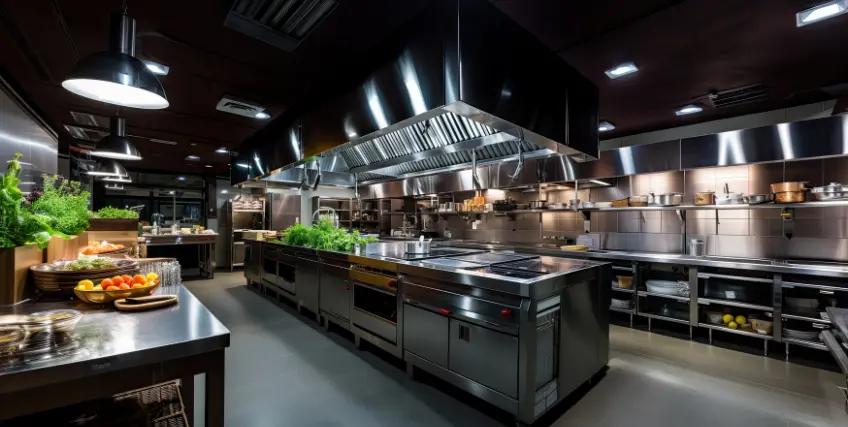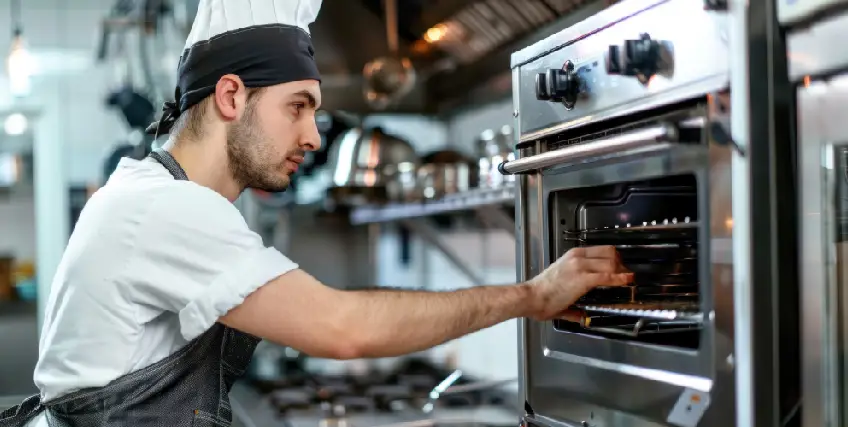The Top Options for Restaurant Business Loans
January 10, 2025 | Last Updated on: January 11, 2025

The Top Options for Restaurant Business Loans
Restaurants are complex operations, and financing them is complicated, as well. This guide explains different restaurant financing options and what you must know to get the right types of loans for your restaurant.
What are Restaurant Loans?
Restaurant business loans are money a restaurant owner borrows to help start, expand, support, or renovate a restaurant business. Doing these things is typically too expensive for most restaurateurs to handle on their own, so they’re usually forced to seek outside financing.
Why do Restaurant Business Owners Apply for Loans?
Some restaurant needs owners apply for loans include:
- Paying for start-up costs
- Renovating an existing location
- Purchasing new equipment
- Opening more new locations
- Adding space to fit more tables
If you’re thinking about applying for a restaurant business loan, it's critical to clearly understand what you want to use the financing for so you can select the right type.
Top Options for Restaurant Business Loans
When you're considering financing for your restaurant, it’s important to compare business loans where your restaurant will qualify. Here are some of the most common types of restaurant business loans and their typical uses.
1. Term Loans from Traditional Lenders
When most people think of bank loans, they think of short-term loans or long-term business loans. They are a common form of restaurant funding. A bank or other traditional financial institution lends a restaurateur a fixed amount of money they pay back with interest through regular payments (typically monthly) over a set time (the loan term). Proceeds from term loans can fund many things, including renovation costs, working capital, hiring employees, and buying equipment.
A traditional loan often has a lengthy and cumbersome application process, which can take two weeks or more. Even when you apply at one of the best banks for restaurant loans, this process can be lengthy. It could be a good option if you have a flexible timeline or start looking for a loan well before you need cash for your business.
This type of financing often requires you to put up collateral to back the loan. It could be business or personal collateral like real estate or equipment. Putting up collateral can sometimes reduce the interest rate you pay on the term loan because you’re putting assets on the line if you fail to repay the financing.
Be aware that a term loan from a traditional funder may come with compounded interest, which means that if you don’t repay the loan quickly, the amount you repay will exponentially increase.
Term length is flexible, typically three to ten years, although loans used to purchase restaurant property can run significantly longer. This flexibility allows restaurateurs to select a loan payback period that works well for their restaurant and needs.
The term length that you choose impacts the interest rate you pay. A shorter-term loan typically has a more favorable interest rate than a longer-term loan because of the extended commitment. Your credit scores (business and personal), years of experience, and organizational financial health are some of the other factors that will impact interest rates.
2. Term Loans from Online and Alternative Lenders
Term loans from alternative lenders are similar to those from traditional financial institutions. The critical difference is that the application process and eligibility determination take place online, and the loan is serviced digitally. Because alternative lenders do not have brick-and-mortar locations, their overhead costs are low, allowing them to charge lower interest rates. They are also usually more flexible about who they offer financing to, and they may be able to provide more flexible repayment terms.
For instance, a traditional bank may expect a restaurant to be in business for more than two years and require the owner to have an excellent credit score before approving a loan. An alternative lender may approve applications from newer restaurants or base approval decisions on business performance and other factors rather than mainly on a personal credit score.
3. Small Business Administration (SBA) Loans
An SBA loan is a long-term business loan backed in part by the United States Small Business Administration (SBA) and offered through a vast network of approved partner lenders. Because of this government backing, SBA loans often come with competitive rates. However, there are many strings attached to SBA loans as well.
A small business owner must have good credit to apply for a Small Business Administration loan. Paperwork requirements are higher, and many restaurateurs find that it is more difficult to qualify for SBA loans compared to other types of loans or financing.
SBA loans offer flexibility in terms of the amount of funding available. Many SBA lenders will approve loans for up to $5.5 million, making them ideal for larger restaurant projects.
The loan application and approval process for an SBA loan is rigorous. It comes with high credit score requirements. Entrepreneurs must submit many documents, including bank statements, tax returns, financial statements, annual revenue, and more. It can take several months to get approved.
SBA loans typically require restaurateurs and other applicants to put down a significant amount of collateral to back the loan. The personal guarantee demonstrates an individual’s investment in the venture.
4. Merchant Cash Advance
A merchant cash advance is where a funding provider pays the restaurant an up-front lump sum to purchase a percentage of a restaurant’s future sales, usually credit card sales, in a merchant cash advance.
Unlike most other funding options where a regular monthly payment is due to a lender, the merchant cash advance purchaser recoups the percentage of sales that it has bought through a deduction from a bank account through an automated clearing house (ACH).
Instead of presenting the loan cost as an interest or annual percentage rate (APR), the cost of merchant cash advances is shown as a factor rate. A factor rate is a fixed percentage of the amount borrowed added to what the restaurant owes the purchaser. For example, a $100,000 loan with a 1.25x factor will result in a $125,000 total loan repayment.
While typically costly, merchant cash advances are an option for restaurants that accept credit or debit card purchases or cashless businesses.
5. Business Line of Credit
A business line of credit functions much like a credit card. A bank or alternative lender approves a business credit line from which the restaurant can draw funds as needed. Like a credit card, there is an assigned spending limit, which must be repaid monthly. Business credit lines provide two key benefits:
- They offer restaurant owners working capital when they need it and the ability to decide how much they need in real-time
- They are relatively easy to qualify for and allow new business owners with bad credit to improve their business credit scores.
It’s typically a smart move for restaurants to have a business line of credit so there’s ready financing available to cover emergencies and take advantage of opportunities.
6. Commercial Real Estate Loan
It's costly to purchase an existing restaurant property, build a new one, or renovate an out-of-date establishment. A commercial real estate loan can help you with the costs. Commercial real estate financing is a long-term business loan with a term that could extend decades. It’s much like a mortgage or home improvement loan you would take out on your house.
Be mindful that lenders will be laser-focused on your restaurant’s financial health before approving you for a commercial real estate loan because they’re making a long-term bet on your business and companies in the restaurant industry have a high likelihood of failure.
7. Restaurant Equipment Financing
Whether purchasing new restaurant equipment like an oven or freezer or replacing old items, using equipment financing could be smart.
An equipment financing lender, often the seller or manufacturer, provides the funds to purchase the equipment, and you pay it back monthly with interest. Equipment loans usually have low interest rates because they’re viewed as low risk. That’s because the equipment is used as collateral and could be seized if the restaurant owner cannot repay the loan.
These loans are a solid way to extend equipment purchase payments over time.
Final Thoughts on Restaurant Business Loans
Now that you understand the small business loan options for your restaurant, you can apply for the financing option and loan amount that’s right for you. What’s critical is that you get several offers from the best banks for business loans so you can select the best one.
Considering all these factors will help ensure that you secure a solid, affordable restaurant loan that meets your business needs from a reputable provider.
Frequently Asked Questions (FAQs) About Restaurant Business Loans
What is the best type of loan for restaurant businesses?
There is no single best type of loan for restaurants. It all depends on your business circumstances and financing needs.
Is it easy to qualify for a restaurant business loan?
Lenders will typically check your business and personal credit scores to see if you qualify for restaurant financing. Many will also check bank statements, tax returns, and your business plan. Restaurants have a high instance of closing after just a few years, so banks and other financial companies do their due diligence when reviewing restaurant loan applications.
I want to purchase a new restaurant location. What kind of financing should I apply for?
A commercial real estate loan could make sense for purchasing a restaurant property. An equipment loan could help you buy necessary kitchen and office equipment. Short- and long-term loans can help with other expenses, including hiring employees. It’s always smart for restaurants to get a business credit line to cover unexpected emergencies.
What credit score is required to get a low-interest restaurant loan?
Credit score requirements can vary from lender to lender. However, a low-interest loan typically requires a high credit score. In addition to your credit score, lenders will also consider your years in operation, bank statements, tax returns, and other factors when determining your credit rating.
What kinds of loans can new restaurants qualify for?
It’s typically smart for new restaurants to turn to non-traditional lenders that often have less rigorous qualification standards than traditional financial institutions. They usually consider factors beyond credit rating when evaluating restaurant loan applications. New restaurants often qualify for business lines of credit.
Frequent searches leading to this page




